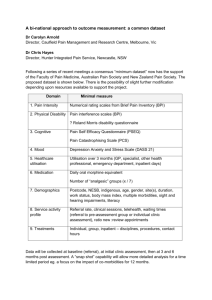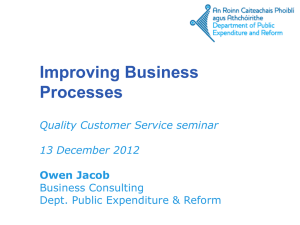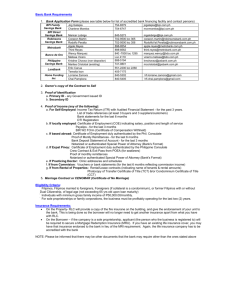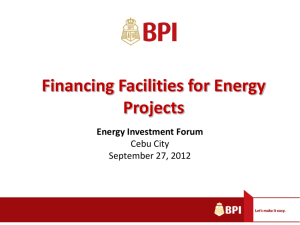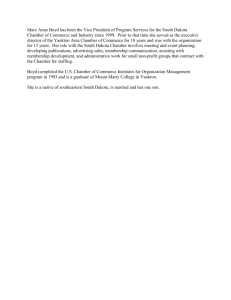Business Price Index
advertisement
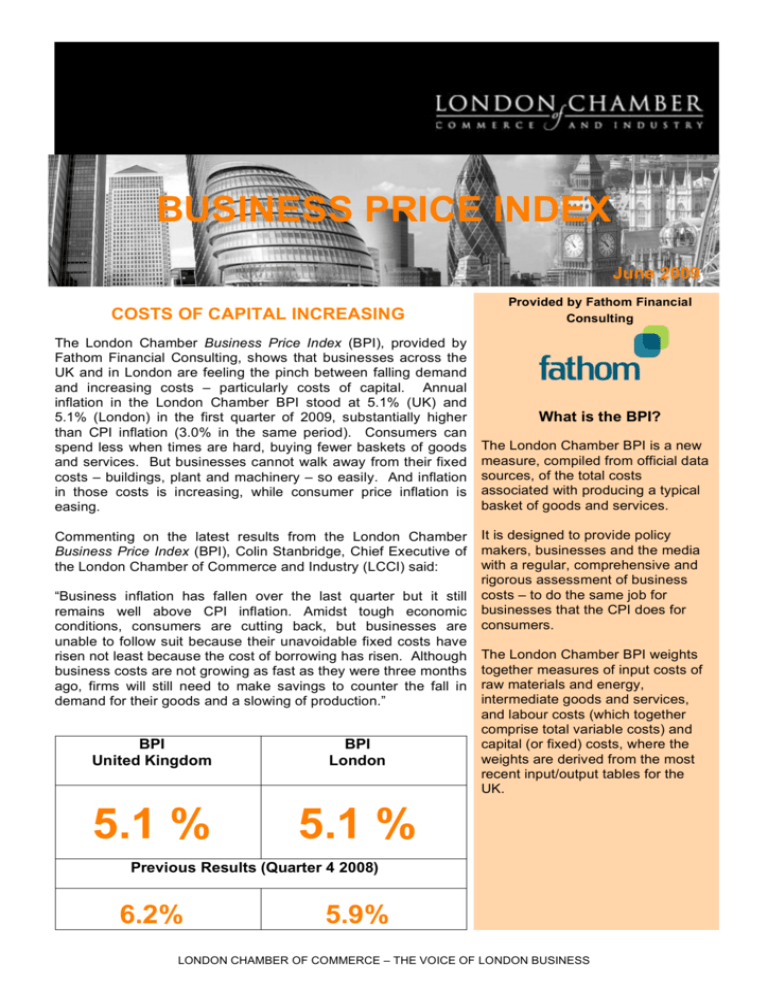
BUSINESS PRICE INDEX June 2009 COSTS OF CAPITAL INCREASING The London Chamber Business Price Index (BPI), provided by Fathom Financial Consulting, shows that businesses across the UK and in London are feeling the pinch between falling demand and increasing costs – particularly costs of capital. Annual inflation in the London Chamber BPI stood at 5.1% (UK) and 5.1% (London) in the first quarter of 2009, substantially higher than CPI inflation (3.0% in the same period). Consumers can spend less when times are hard, buying fewer baskets of goods and services. But businesses cannot walk away from their fixed costs – buildings, plant and machinery – so easily. And inflation in those costs is increasing, while consumer price inflation is easing. Commenting on the latest results from the London Chamber Business Price Index (BPI), Colin Stanbridge, Chief Executive of the London Chamber of Commerce and Industry (LCCI) said: “Business inflation has fallen over the last quarter but it still remains well above CPI inflation. Amidst tough economic conditions, consumers are cutting back, but businesses are unable to follow suit because their unavoidable fixed costs have risen not least because the cost of borrowing has risen. Although business costs are not growing as fast as they were three months ago, firms will still need to make savings to counter the fall in demand for their goods and a slowing of production.” BPI United Kingdom BPI London 5.1 % 5.1 % Provided by Fathom Financial Consulting What is the BPI? The London Chamber BPI is a new measure, compiled from official data sources, of the total costs associated with producing a typical basket of goods and services. It is designed to provide policy makers, businesses and the media with a regular, comprehensive and rigorous assessment of business costs – to do the same job for businesses that the CPI does for consumers. The London Chamber BPI weights together measures of input costs of raw materials and energy, intermediate goods and services, and labour costs (which together comprise total variable costs) and capital (or fixed) costs, where the weights are derived from the most recent input/output tables for the UK. Previous Results (Quarter 4 2008) 6.2% 5.9% LONDON CHAMBER OF COMMERCE – THE VOICE OF LONDON BUSINESS WHAT IS DRIVING BPI? Falling oil prices and falling wage costs in financial services mean that annual BPI inflation slowed in 2009 Q1. But it remains over 2% points higher than annual CPI inflation in the same period. The gap reflects higher inflation in the cost of capital for businesses, as the credit crunch bites harder. The BPI measures the costs associated with producing the typical basket of goods and services. And, while the cost of capital is rising, demand for goods and services is falling, thanks to the recession. Unlike variable costs, the costs of capital are fixed costs that cannot be avoided when demand falls: buildings, plant and machinery are expensive even when factories stand idle. Annual inflation in fixed costs rose to 10.3% in Q1, reflecting both higher lending rates to businesses and falling output from those businesses. Annual inflation in variable costs (labour, fuel and raw materials, and bought-in goods and services) fell to 2.2% (UK) and 2.0% (London), reflecting lower oil prices and wage costs, especially in financial services, where Q1 bonuses were far smaller than usual. It is interesting that the costs of electricity, gas and water continued to grow in Q1 in spite of lower global commodity prices: we expect these cost pressures to ease in coming quarters, particularly if sterling continues to strengthen against the dollar. UK BPI and contributions Annual percentage changes 8 6 BPI 4 Variable costs 2 0 Fixed costs -2 -4 01 02 03 04 05 06 07 09 BPI and CPI 7 Annual percentage changes 6 BPI 5 4 3 2 CPI 1 The London Chamber BPI, provided by Fathom Financial Consulting, will be updated on a quarterly basis. The next update in August will include a preliminary estimate of BPI inflation for the second quarter of 2009. 08 0 -1 -2 -3 01 02 03 04 05 06 07 08 09 For questions on the motivation for this research and how it might be used, contact Helen Hill at the London Chamber of Commerce and Industry. For technical questions on the construction of the London Chamber BPI, contact Erik Britton at Fathom Financial Consulting. Helen Hill; Director of Policy & Public Affairs; hhill@londonchamber.co.uk; T 020 7203 1882; M 07500 013 166 Erik Britton; Director; Fathom Financial Consulting; erik.britton@fathom-consulting.com; T 020 7796 9669; M 07854 788 462 London Chamber of Commerce and Industry is the capital’s largest and most representative business organisation, comprising some 3,000 members which together employ 500,000 people. Our members range in size from multi-nationals such as BT and Thames Water to SMEs and sole traders. www.londonchamber.co.uk Fathom Financial Consulting is a new kind of consultancy. Independent and rigorous, Fathom brings cuttingedge economic and econometric methods to bear on the problems confronting governments and businesses across the industrial spectrum. www.fathom-consulting.com LONDON CHAMBER OF COMMERCE – THE VOICE OF LONDON BUSINESS
